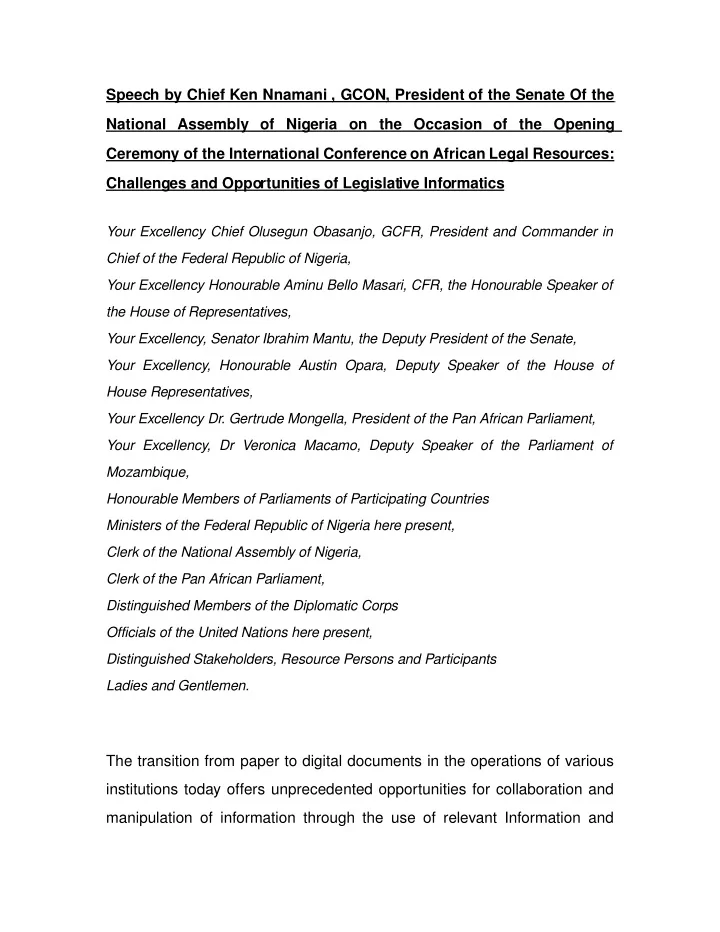

Speech by Chief Ken Nnamani , GCON, President of the Senate Of the National Assembly of Nigeria on the Occasion of the Opening Ceremony of the International Conference on African Legal Resources: Challenges and Opportunities of Legislative Informatics Your Excellency Chief Olusegun Obasanjo, GCFR, President and Commander in Chief of the Federal Republic of Nigeria, Your Excellency Honourable Aminu Bello Masari, CFR, the Honourable Speaker of the House of Representatives, Your Excellency, Senator Ibrahim Mantu, the Deputy President of the Senate, Your Excellency, Honourable Austin Opara, Deputy Speaker of the House of House Representatives, Your Excellency Dr. Gertrude Mongella, President of the Pan African Parliament, Your Excellency, Dr Veronica Macamo, Deputy Speaker of the Parliament of Mozambique, Honourable Members of Parliaments of Participating Countries Ministers of the Federal Republic of Nigeria here present, Clerk of the National Assembly of Nigeria, Clerk of the Pan African Parliament, Distinguished Members of the Diplomatic Corps Officials of the United Nations here present, Distinguished Stakeholders, Resource Persons and Participants Ladies and Gentlemen. The transition from paper to digital documents in the operations of various institutions today offers unprecedented opportunities for collaboration and manipulation of information through the use of relevant Information and
Communication Technologies. Parliaments as cornerstones of representative democracies require, on the one hand, ready access to vital information for the fulfillment of their core mandates of law-making and oversight. On the other hand, as a type of production factory of essential legislative information, the importance of the harnessing and use of available technologies and tools by parliaments to ensure efficient management and distribution of information cannot be over-emphasized. While the electronic revolution brings several opportunities, it also poses new challenges to African parliaments in the sense that our parliaments are largely not yet well equipped to address these issues. Such challenges vary from use of outdated skills, laws, and institutional arrangements to the absence of policies, standards and best practices for creating, organizing and using digital records. These constraints are responsible for the poor state in which document and data management is presently carried out in the legislative domain. Distinguished ladies and Gentlemen, this Conference tagged ‘African Legal Resources: Challenges and Opportunities of Legislative Informatics” is about developing Africa-wide shared standards for legislative and legal knowledge and how to exploit the huge potentialities of ICTs in the legal domain. This, it is envisaged, will empower parliaments and pu blic administration by providing them with the means and ways to make legal information and knowledge widely available. It is my belief that Africa now has a golden window of opportunities that should be collaboratively exploited. Only a few years ago it would have 2
been too early, since the level of deployment of ICTs in Africa was not yet as diffused as it is today but also because the expertise and technologies for such advanced legal services were either not available or still in an experimental phase. Looking into the future, if African parliaments individually pursue IT systems development, then implementing the collaborative effort as articulated in the Conference Aide Memoire, would be very expensive and time-consuming. Different countries possibly would have gone in different directions with regards to organizing their legal information. This too may be associated with incompatible and sub-optimal standards. The National Assembly of Nigeria is therefore very pleased about this present initiative which UNDESA is championing in partnership with African Parliaments under the aegis of the Pan African Parliament in the development and adoption of common tools and standards. This Conference indeed represents a big step forward and a consolidation of the Nairobi Declaration issued two years ago at the close of the International Conference on Parliaments’ Information Management in Africa “Challenges and Opportunities of ICTs to Strengthen Democracy and Parliamentary Governance” The Declaration, among other things, recommended that the Leadership of “African Parliaments continue to lead the process of ICTs diffusion and modernization of Parliaments to improve access to information, strengthen parliamentary democracy and foster inter-parliamentary cooperation. It also called on African Parliaments’ IT Professionals to meet regularly to exchange views and experiences for the 3
harmonization of IT structures and concepts, and enjoined the leadership of various Parliaments to commit to this goal. Today gathered here are African Parliamentary delegates, officials of the judiciary, legal and ICT experts, representatives of technologically-more advanced parliaments to deliberate not only on the broad spectrum of Africa’s legal resources in general, but also in particular the inherent challenges and opportunities offered by legislative informatics. At this juncture, I wish to state that the National Assembly of Nigeria is in the process of upgrading its IT facilities under the IT infrastructure development project. Part of this process involves the identification, acquisition and deployment of a Legislative Management System. The solutions proffered by this Conference based on common standards and international best practices are definitely timely. Distinguished parliamentarians and stakeholders, may I solicit the collective commitment of our Parliaments to continue to act as change agents in taking advantage of the opportunity offered by ICTs to strengthen democracy and promote cooperation among national institutions. The National Assembly of Nigeria on its part would continue to support this noble initiative. Thank you. 4
5
Recommend
More recommend